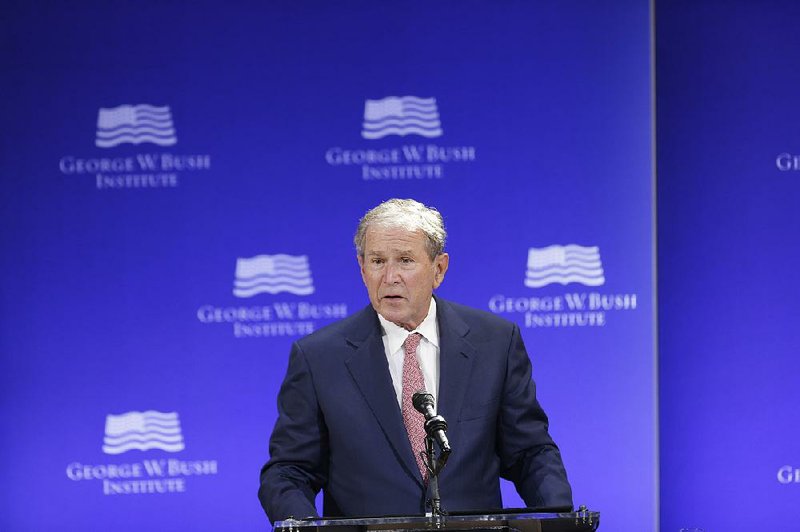Former President George W. Bush on Thursday delivered a sustained rebuke of current national politics and political discourse, decrying nationalism, protectionism and the coarsening of public debate while calling for a robust response to Russian interference in American democracy.
In a speech at a New York City conference hosted by the George W. Bush Institute, Bush defended free trade, globalization and immigration even as President Donald Trump seeks to raise barriers to international commerce and newcomers from overseas. He condemned the "casual cruelty" he sees in public discourse and denounced white supremacy two months after Trump suggested that "both sides" were to blame at a neo-Nazi rally that turned violent in Virginia.
"We've seen nationalism distorted into nativism, forgotten the dynamism that immigration has always brought to America," Bush said. "We see a fading confidence in the value of free markets and international trade, forgetting that conflict, instability and poverty follow in the wake of protectionism. We've seen the return of isolationist sentiments, forgetting that American security is directly threatened by the chaos and despair of distant places."
The former president said these afflictions have created a crisis of confidence in the United States that has endangered its historic ideals.
"In all these ways, we need to recall and recover our own identity," he said. "Americans have great advantage. To renew our country we only need to remember our values."
Bush addressed these issues at a bipartisan conference that his presidential center sponsored in New York to promote democracy and freedom. Since leaving office in January 2009, he has largely sought to avoid engaging in current-day political struggles, even as he promotes issues he has long cared about such as the spread of democracy around the world.
Asked by a reporter as he left the hall whether his message would be heard in the White House, Bush smiled, nodded slightly and said, "I think it will."
Asked about the speech, Trump said he hadn't seen it.
The Bush family has never been fond of Trump, who beat former Gov. Jeb Bush of Florida for the Republican presidential nomination last year. Neither the former president nor his father, former President George H.W. Bush, voted for Trump in November. But advisers said the younger Bush has been deeply troubled by the state of the national debate under a president who routinely demonizes his adversaries on Twitter.
"Bullying and prejudice in our public life sets a national tone, provides permission for cruelty and bigotry and compromises the moral education of children," Bush said in his speech. "The only way to pass along civic values is to first live up to them."
Bush, who issued a statement with his father condemning white supremacists after the violence in Charlottesville, Va., in August, returned to the theme.
"Bigotry or white supremacy in any form is blasphemy against the American creed," he said.
Along with the conference, the president released a paper examining threats to the liberal democratic order and making recommendations for protecting and strengthening American institutions. The paper was drafted by Peter Wehner, a former adviser in Bush's White House, and Thomas Melia, a former State Department official under President Barack Obama.
The conference also featured a panel with two former secretaries of state, Condoleezza Rice and Madeleine Albright, joining Nikki Haley, Trump's ambassador to the United Nations.
Rice, who served under Bush, and Albright, who served under President Bill Clinton, seemed to gently coach Haley, urging the Trump administration to rethink its cuts to the State Department budget and its approach to the U.N., to protect rather than attack the news media and to make a stronger response to Russian meddling in last year's election.
Bush echoed that last call in his own speech.
"America has experienced a sustained attempt by a hostile power to feed and exploit our country's divisions," he said. "According to our intelligence services, the Russian government has made a project of turning Americans against each other."
He added, "We must secure our electoral infrastructure and protect our election system from subversion."
The former president acknowledged the forces of discontent that have given rise to Trump.
"We should not be blind to the economic and social dislocations caused by globalization," he said. "People are hurting. They're angry and they're frustrated. We must hear and help them. But we cannot wish globalization away any more than we could wish away the agricultural revolution or the Industrial Revolution."
Information for this article was contributed by Steve Peoples and Laurie Kellman of The Associated Press.
A Section on 10/20/2017
